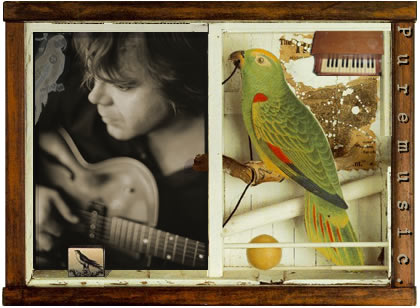
A Conversation
with Jeff Black
Puremusic: Where are you tonight?
Jeff Black: I'm in Dallas. I'm going down to Houston tomorrow night, then back up to Dallas to play Friday night.
PM: What are your Dallas venues?
JB: Dallas is Uncle Calvin's Coffeehouse, and then there's also Bill's Records.
PM: Do you take gigs that don't have a piano there, or is it a requirement that they have a piano there for you?
JB: Well, I just kind of go and play. The Medicine Show will go on one way or the other, but yeah, I love it when there's an acoustic piano. I actually love that the best. And if there is one, I'll almost always--
PM: Play it all night.
JB: Yeah. Try to, anyway.
PM: Yeah, right. Yeah, because I've seen you sometimes when there was no piano on stage, and you just play guitar all night, and it sounds great, too, but I love it when there's an acoustic piano and you get to do that.
JB: Yeah. I always take my little tenor banjo with me, too, and play that as well.
PM: Oh, really?
JB: Yeah. I like to have it with me. It's hard to fly with it, but when I'm driving, I always got my banjo.
PM: Ah. I do like a five-string string banjo. I've never really had a chance to mess around with a tenor. What kind of a banjo is it?
JB: It's just one of those old Star banjos. And I don't know who used to make it. I don't know if Monkey Wards used to make them or Sears and Roebuck. Somebody said that Washburn used to make those banjos.
PM: So do you pick or you strum it, or how to you approach it?
JB: I usually pick it.
PM: Yeah. I got to see you do that once, now I recall. Do you do that on the records much?
JB: Just on B-Sides and Confessions.
PM: Right.
JB: Yeah. And there's one song called "Gold Heart Locket" that--a friend of mine had given me that banjo. I used to talk about my dad playing the banjo. And I was talking about a friend of mine, Bruce Spaulding, who collects guitars there in town. I don't know if you know Bruce or not.
PM: I don't think so, no.
JB: And he just brought it over to me one day. He said, "Here you go. I thought you might get a kick out of that."
PM: Wow.
JB: And it's real tiny, and I just like to bring it with me. It kind of breaks it up. I love the acoustic guitar, but if I had my druthers I'd travel with a band everywhere I went.
PM: Right, of course.
JB: But if I can't do that, I'll bring the acoustic, the banjo, and if there's a piano, I'll certainly play that.
PM: Absolutely. I'm a big fan of your music regardless, but to me the quintessential Jeff Black is when he's sitting at the keyboard.
JB: I feel very flattered that you say that, because I don't really consider myself much of a piano player.
[laughter]
PM: But I think that instrument brings out something in your songwriting that's really rare among songwriters today.
JB: Yeah, you're kind of operating in a whole different little theater. I think the physical action of playing a piano is so completely different than a guitar, although you're still working with a percussion instrument. It's something that takes you to an entirely different place.
PM: I know you may not consider yourself a good keyboard player--but many songwriters tend to get more polyphonic on the keyboard right away and start playing all these weird chords, and then never play the root in the bass and all that stuff.
JB: Right, yeah.
PM: The Joni Mitchell thing, for lack of a better explanation.
JB: Yeah, and especially if you're--I think that comes from all the years of just being kind of a troubadour and playing by yourself. And that root note is--man, you've got to have the cornerstone. You got to have the foundation down. Then the chaos on top is little easier to take.
PM: [laughs] It's interesting, really, that you get compared to people that others are seldom compared to, like Springsteen, Billy Joel, Harry Chapin--to which I would definitely add Marc Cohn and Sir Elton John, as well as Neil Diamond, if I may. Don't you think that a lot of that is because many of those tunes get composed on piano, that they start there and go to a different place?
JB: It could very well be. I always find it really curious to be compared to other folks. I always figured I was just writing my songs, contemporary, or whatever bin you wanted to set it into. And there have been a few songs that I started on guitar, and then moved to piano, just because I always feel like the songs dictate everything about where they want to live and how they want to sound. And I think the best trick is just to get out of the way.
PM: It's the best trick, the most important trick, and sometimes the hardest trick.
JB: Yeah. continue
print (pdf) listen to clips puremusic home